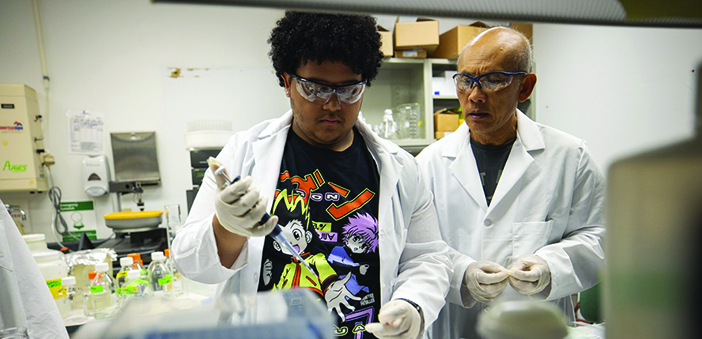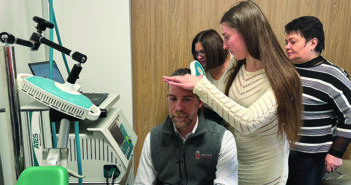Pathology summer program welcomes local teens to explore careers in science and research.
As a seventh-grader at the Learning Community Charter School in Central Falls, RI, Ailyn Mendoza developed a passion for science class. Learning about biology and life sciences was exciting, she says, and her curiosity for a career in science and medicine continued as she advanced through high school.
“I’ve always had an interest in learning about illness and disease and how it affects the human body,” Mendoza says. “But I never wanted to be a primary care physician, and I thought, there has to be something else that I can do where I can still contribute to patients or public health—but just not in the role of an everyday doctor.”
During the summer before her senior year at Central Falls High School in 2022, the local teenager discovered that “something else,” through a new internship program at Brown University, where the Department of Pathology and Laboratory Medicine welcomes more than half a dozen Providence-area students to campus each summer for a paid internship that exposes teens to careers in pathology, scientific research, and lab medicine.
By working full time as paid interns—which includes shadowing pathologists in the city’s hospitals, reviewing scientific literature, and serving as research assistants in Brown’s state-of-the-art labs—the high schoolers are immersed in the day-to-day work of physician-scientists, researchers, and lab technicians. They learn how the specialized medical field of pathology fundamentally influences patient outcomes through medical research, disease detection, and treatment planning.
For six weeks, the interns engage in diverse and complex areas of disease study, including toxicology, cancer biology, malaria pathobiology, and vaccine development. Yet, the goal of the program is much simpler.
A few dozen Brown faculty, researchers, staff, and students who serve as teachers and mentors hope to plant seeds of interest in the young Rhode Islanders by creating unique hands-on learning opportunities that promote early exposure to science and medicine, says Jonathan Kurtis ’89 PhD’95 MD’96, chair of the Department of Pathology and Laboratory Medicine.
“The idea is to expose high school students to basic and translational science in the life sciences and medicine,” Kurtis says. “The students leave with that new understanding of what a pathologist does, but we also hope they see that scientists can have fun, they see the types of jobs are interesting, and they can see themselves in these kinds of roles.”




